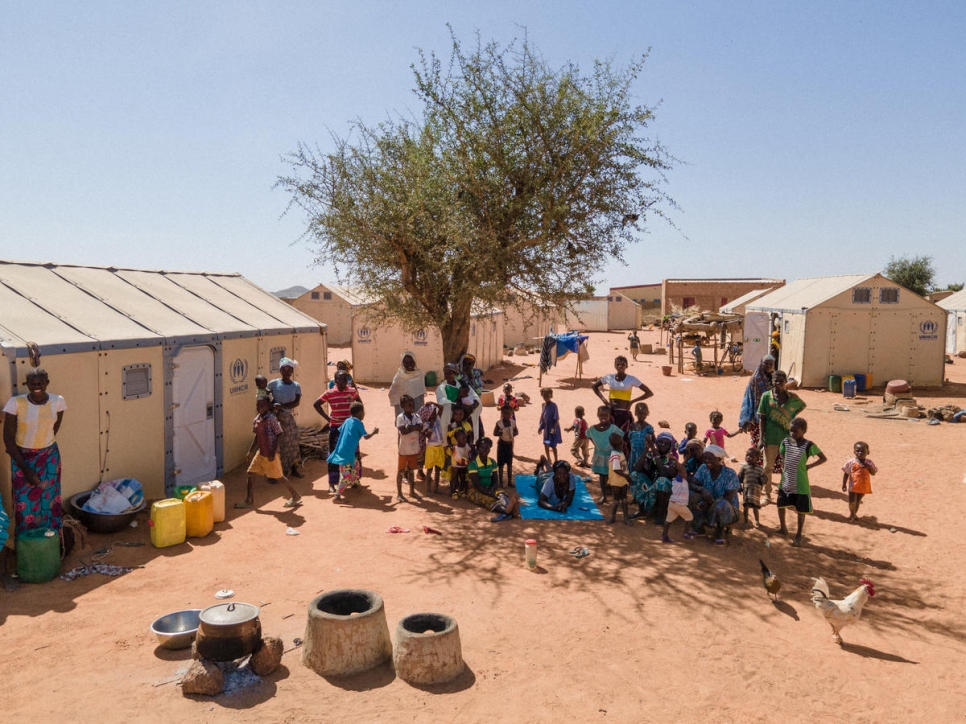This is a summary of what was said by UNHCR spokesperson Babar Baloch – to whom quoted text may be attributed – at today's press briefing at the Palais des Nations in Geneva.
 Internally displaced people in northern Burkina Faso in November 2020. © UNHCR/Anne Mimault
Internally displaced people in northern Burkina Faso in November 2020. © UNHCR/Anne Mimault
UNHCR, the UN Refugee Agency, strongly condemns the latest attack by armed groups that killed at least 138 civilians in Burkina Faso, the deadliest attack since 2015.
On 5 June, gunmen attacked the village of Solhan in Burkina Faso's northeast Sahel region, near the border with Niger. Assailants stormed the village in the middle of the night and executed 138 men, women and children. Houses and the market were set ablaze. Close to 40 people were seriously injured and taken to hospitals in the region and in the capital city, Ouagadougou.
Fearing for their lives, over 3,300 people fled to the nearby villages of Sebba and Sampelga, among them more than 2,000 children and over 500 women. They arrived with few or no belongings. The majority were generously welcomed by local families who are sharing what little they have.
The new arrivals urgently need water and sanitation, shelter, essential aid items and medical care. Authorities have delivered almost 400 tons of food and thousands of relief items, while UNHCR partners are providing medical care and psychosocial support.
In close collaboration with the authorities, our teams and partners are building 200 shelters and assisting those newly displaced and other civilians affected by the attack. More resources are needed to scale up the response.
This extreme violence comes just a few weeks after gunmen shot at UNHCR and partner vehicles on the road between the city of Dori and the Goudoubo camp, where some 12,200 Malian refugees and asylum-seekers reside. No one was harmed, but growing insecurity and the presence of armed groups in several regions of Burkina Faso increasingly hamper the delivery of aid and protection for those in need.
UNHCR stands in solidarity with the families of the victims, the people and the government of Burkina Faso. It calls for concerted action to reinforce the protection of civilians and reminds all parties that humanitarian organizations are carrying out lifesaving interventions in an independent and impartial manner.
Since 2019, violence in the country has forced more than 1.2 million Burkinabe from their homes. Already this year, some 150,000 people have been internally displaced, with 84 per cent either women, who face a high risk of gender-based violence, or children, half of whom have reportedly been subjected to physical violence and abuse. In addition to the IDPs, Burkina Faso continues to generously host more than 22,000 refugees and asylum-seekers, mostly from Mali.
Neighbouring Central Sahel countries Mali and Niger have also experienced a sharp rise in violence and displacement. Mali hosts 372,000 IDPs, a 7 per cent rise since the start of the year.
In total, 237,000 refugees and 300,000 IDPs live in Niger, with a rise of 4,000 refugees and 2,000 IDPs since the start of the year following an increase in attacks in the Tillabéri and Tahoua regions. In total, some 300 civilians have been killed since the start of the year in three major attacks. Many IDPs and some Malian refugees have been among the victims.
More resources are urgently needed to address growing humanitarian needs as funding for UNHCR's response remains critically low. UNHCR's funding requirements for the Central Sahel countries of Burkina, Mali and Niger in 2021 is US$259.3 million. So far only a quarter of the funds requested have been received.






